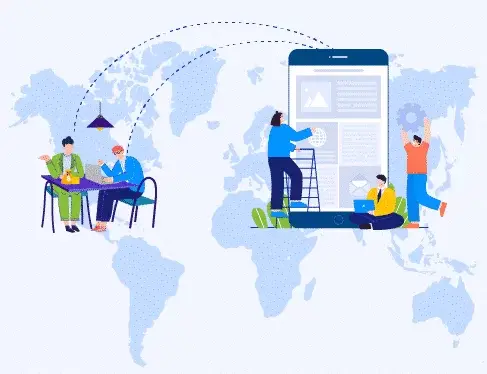What are managed IT services?

Small businesses exploring IT outsourcing options can turn to managed services for help. Managed service providers (MSPs) manage your company's technology needs for a fixed monthly rate. They keep a close watch on your business network, reducing IT issues, and fixing any problems that arise.
Thanks to cloud computing advancements, many IT tasks can be outsourced. MSPs can access networks remotely to resolve computing issues without being physically present.
MSPs offer contracts that clearly outline the proactive services they provide, including start and end dates. Outsourcing options from vendors may include:
- Mobile device management
- Software as a service (SaaS)
- Platform as a service (PaaS)
- Help desk services
- Top-notch cloud backup and storage solutions
Most MSPs also offer comprehensive packages that provide unlimited IT resources and day-to-day network management during the contract period.
[Related article: Best 10 MSP software in 2024 for successful growth]
You may also look at these popular and leading CRM options for different business needs and services:
Why do small businesses need managed IT services?
It’s not just about having top-notch, fully encrypted data security and monitoring. Small businesses need a smooth start every day without feeling restricted. MSPs (Managed Service Providers) or other IT providers for small businesses handle all necessary IT functions to maintain smooth operations and protect against cyber-attacks and malware. Here are key reasons why small businesses should quickly consider hiring a top-quality managed IT services provider:
- Expert data security: Every business, whether new or established, needs strong data security and monitoring. Managed IT service providers offer these essential services, ensuring businesses are always protected.
- All-day supervision: Imagine having an outsourced team proactively monitoring your company's IT activities with the highest agility. This constant protection allows small businesses to emulate the security measures of larger companies, safeguarding their IT environment.
- Help desk support: When daily operations face issues, businesses need quick solutions. A 24/7 active help desk support services provide accurate information during emergencies and offer the best alternatives to resolve problems. This means you have a reliable support team ready to answer every query with convincing responses.
- Improved outsourced collaboration: Cost-efficient IT data monitoring and security services are ideal for startups and small companies. Outsourced IT services for small businesses help companies grow and provide the support needed. This collaboration allows small businesses to enhance their international and regional partnerships through managed service platforms.
Benefits of managed IT services for small business

MSPs stand out from other tech support methods because they centralize and support many aspects of IT for small businesses. For instance, an MSP can manage your company’s networking, help desk inquiries, server maintenance, project management, and desktop support.
Unlike a computer store or an independent tech professional, MSPs serve multiple clients simultaneously, offering a wider range of resources and a more extensive knowledge base.
However, small businesses should consider several factors before opting for an MSP. Does the MSP fit within your budget? Is your technology secure?
Benefits of using an MSP for small businesses include:
- Proactive solutions: An effective MSP prevents technical issues before they happen. They continuously monitor IT elements like hardware, applications, security, technology trends, and the internet, alerting you to any issues or abnormalities. They may also suggest software upgrades to boost productivity, ensuring you're paying to prevent problems rather than fix them.
- Provision of technology: Some MSP plans include providing all the technology your business needs, such as workstations, servers, and software. While this can be costly, it eliminates capital expenditures for technology, freeing up funds for other areas of your business.
- Tech expertise: If your business relies on one person for all IT needs, they might not be an expert in every area. They might be great at troubleshooting Microsoft Word, but what if your router fails? MSPs typically have skilled personnel dedicated to each IT function, making them better equipped overall.
- Business continuity: As a business owner, have you thought about how you would restore your systems and data in the event of a disaster? If not, you should. An MSP can significantly assist by developing a robust disaster recovery plan, ensuring your business can withstand incidents like ransomware attacks and other cybersecurity risks.
[Related article: 15 Important Benefits of Remote Management and Monitoring]
Full-Featured Sales CRM

4.8
10 Essential managed IT services for small businesses
1. Network security
IT network managers rely on tools to monitor the overall health of a network. These tools can alert them about components that have failed and, more critically, identify those that may need intervention to prevent failure.
These monitoring tools can also detect signs of cyber attacks and other unusual activities.
Ensure you have skilled personnel on call 24/7 to respond to network alerts. These staff members should be capable of assessing and addressing issues flagged by network monitoring tools across:
- Servers
- Workstations
- Cloud services
- All connected devices
2. Data backup and disaster recovery
Having a functioning data backup device alone isn’t enough to quickly restore operations after a data breach, natural disaster, or similar event. You also need:
- Effective pre-planning
- A mix of on-site and cloud solutions
- A post-event response plan that your employees are trained to follow
Key elements of backup and disaster recovery include:
- Assessment: Conduct an initial assessment and test of your current backup system.
- IT infrastructure configuration: Set up your IT infrastructure with redundant internet, backup services, and cloud recovery options for your servers.
- Backup testing and monitoring: Regularly test and monitor your backup system.
- Disaster recovery plan: Develop and document a detailed disaster recovery plan and ensure it is tested.
- Backup hardware: Provide options for backup hardware and emergency power sources.
Being prepared for data loss or major business disruptions can give you a competitive edge. By having a well-tested disaster recovery plan, you can avoid significant financial losses from business interruptions and cyber-attacks, setting your business apart from competitors.
3. Cloud computing services
Cloud computing services offer small businesses scalable and flexible IT solutions without the need for extensive on-site hardware. Managed IT services ensure seamless integration, management, and optimization of cloud resources, enabling businesses to store data, run applications, and access computing power over the internet. This reduces costs and increases accessibility and collaboration.
4. Managed IT support
Best IT support for small businesses provides round-the-clock assistance for technical issues, ensuring minimal downtime and efficient problem resolution. This includes help desk services, troubleshooting, and remote support, allowing small businesses to maintain smooth operations and focus on their core activities without worrying about IT disruptions.
5. Network infrastructure management
Effective network infrastructure management ensures a reliable and secure network environment. Managed IT services cover the design, implementation, monitoring, and maintenance of network systems, including routers, switches, and wireless access points. This ensures optimal network performance, security, and connectivity, which is crucial for business operations.

6. Cybersecurity services
The aim of a cybersecurity program is not to prevent all cyber attacks, as that’s impossible for companies of any size. Instead, the goal is to implement strong, reasonable measures that make your company a less appealing target for criminals. Managed IT services for small businesses are the most effective way to achieve this.
Essential cybersecurity services:
- Training: Employee training is crucial since many cyberattacks involve phishing or tactics that exploit employee ignorance. Training should include onboarding for new employees and regular updates for all staff.
- Firewall management: Installation, updates, and continuous monitoring of firewalls.
- Anti-spam and antivirus protection: Regular testing and maintenance of current tools, with recommendations for better tools if needed.
- Encryption: Protect PCs, laptops, mobile devices, and email with encryption.
- Security patches and software updates: Prompt installation of security patches and software updates.
- Documented policies and procedures: Ensure employees know how to prevent cyber losses with documented policies and procedures, compliant with industry regulations, and regularly reviewed/updated.
- Password management: Use tools like LastPass to help employees generate secure passwords, preventing the reuse of passwords across multiple sites.
- Data backup and recovery plans: Crucial for cybersecurity and other operational reasons.
- Dark Web monitoring: Monitor the Dark Web for employee user IDs, passwords, and other data for sale. This can help identify cybersecurity lapses and improve employee training.
[Related article: A Comprehensive Insight RMM Software Tools]
7. Software updates and patch management
Regular software updates and patch management are vital for maintaining security and functionality. Managed IT services handle the timely application of software updates and patches, protecting systems from vulnerabilities and ensuring that all applications run smoothly and efficiently. This proactive approach minimizes the risk of cyberattacks and enhances overall system performance.
8. Hardware maintenance and lifecycle management
Hardware maintenance tasks and lifecycle management involve the upkeep and eventual replacement of IT hardware. Managed IT services oversee the procurement, installation, maintenance, and disposal of hardware, ensuring that equipment is always in good working condition and replaced when necessary. This helps small businesses avoid unexpected failures and optimize their hardware investments.
9. Compliance management
Compliance management ensures that a business adheres to industry-specific regulations and standards. Managed IT services help small businesses navigate complex compliance requirements by implementing necessary security measures, maintaining documentation, and conducting regular audits. This reduces the risk of legal penalties and enhances data protection practices.
10. IT consulting and strategy planning
IT consulting and strategy planning provide small businesses with expert advice on leveraging technology to achieve their goals. Managed IT services offer strategic planning, identifying the best IT solutions to align with objectives, optimize business processes, and drive growth. This includes assessing current IT infrastructure, recommending improvements, and implementing innovative technologies.
Choosing the right managed IT service provider for small businesses

Choosing the right managed IT service provider (MSP) is crucial for small businesses. Start by identifying your specific IT needs, such as comprehensive support, cloud services, cybersecurity, network management, hardware maintenance, or other additional services. Look for experienced IT support companies for small businesses with a proven track record in managing IT systems similar to yours and one that stays updated with the latest technologies.
Review the range of services offered to ensure they align with your specific business needs and can scale as your business grows. Evaluate the MSP’s response time guarantees and availability to ensure they provide 24/7 support and quick response times. Assess their security protocols, including firewalls, antivirus protection, encryption, and regular security audits.
Check customer references and testimonials to gauge reliability and performance. Ensure the MSP is knowledgeable about industry-specific regulations and compliance requirements relevant to your business. Compare pricing structures and focus on the value provided, including the quality of services, expertise, and support.
Review Service Level Agreements (SLAs) carefully, ensuring they outline response times, resolution times, and performance metrics. Consider the cultural fit of the MSP with your business for smoother communication and collaboration.
Engage the MSP on a trial basis, if possible, to assess their performance and compatibility. By thoroughly evaluating potential MSPs, you can find a partner that supports your IT infrastructure, enhances security, and contributes to your business’s success.
[Related article: How to Choose a CRM System: Checklist with 6 Tips]
How managed IT services can support small business growth
Managed IT services can significantly boost business growth by providing comprehensive IT support for small businesses, reducing downtime, and enhancing security. They offer scalable solutions that adapt to a company's needs, allowing for efficient handling of network management, cloud services, and cybersecurity.
By ensuring IT systems are reliable and up-to-date, managed IT services free up resources and time, enabling businesses to focus on core activities and strategic growth. Additionally, access to expert advice and advanced technology helps small businesses stay competitive and innovative.




.png)



